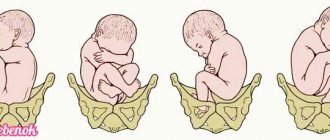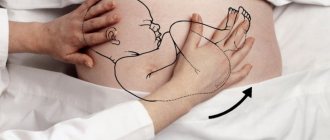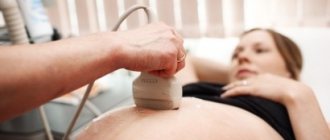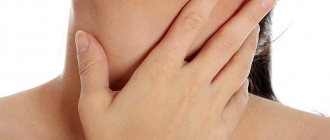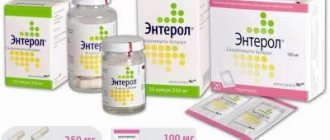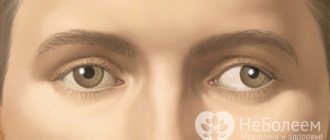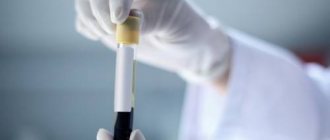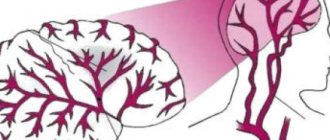Fetal development at 19 weeks of gestation
Fruit size:
20-21 cm.
Fruit weight:
200-230 g.
The 19th obstetric week of pregnancy is the third week of the fifth obstetric month of pregnancy. At this stage, you will probably begin to feel the movements of your baby, while still light tremors bring only delight and tenderness. Your child is actively growing and developing, and you are changing along with him. In this article we will find out what changes are happening this week.
19 weeks, how many months is that? Week 19 is the middle of the 5th obstetric month (19 weeks = 4 months and 13 days). You are in your second trimester.
What's happening?
At this stage of pregnancy, the most beautiful and most enjoyable stage of your life continues. At this stage, mommy usually feels excellent; despite periodic painful sensations in the lower back and legs, the mood is excellent, because toxicosis is behind us, and the uterus is not yet compressing the internal organs so much as to cause concern.
You may already find it difficult to choose a comfortable sleeping position. It’s been a long time since you can sleep on your stomach, nor on your back, because the uterus can put pressure on the inferior vena cava, and blood circulation is disrupted. Special pillows are produced for expectant mothers that help them choose a comfortable position and sleep soundly.
Recommendations
The 19th week of pregnancy, a photo of the fetus in which can already reflect the main features of appearance, should take place with a stable rhythm of life.
It is very important to maintain an emotional background and not allow yourself to get nervous about anything.
Pregnancy is a period during which there is a constant choice between “intended benefits for the mother and possible risks for the fetus.” Therefore, only a specialist who has been caring for the pregnancy since the woman’s first request can determine the admissibility of a particular drug.
The following drugs can be distinguished from the approved drugs:
- Glycine is a natural amino acid;
- Magne B6 – a combination of magnesium and vit. AT 6;
- Nervohel is a homeopathic remedy;
- natural extracts of motherwort and valerian.
Glycine is a substance belonging to the group of main inhibitory neurotransmitters in the brain. It normalizes processes and reduces psycho-emotional stress, promotes a harmonious alternation of sleep and wakefulness cycles during the day, thereby improving sleep and the quality of night rest.
Preparations with glycine can be used 2-3 times a day, 100 mg at a time. Another option is to take 2-3 tablets just before bed. For maximum speed of development of the effect, glycine should be slowly dissolved under the tongue. The course of treatment is 1-2 weeks. If necessary, it can be continued until the optimal therapeutic effect is achieved.
Magnesium plays a significant role during pregnancy as this micronutrient is involved in the normal maturation of the placenta. In addition, it is necessary for the construction of protein tissues of the fetus and the regulation of uterine tone. Taking medications with magnesium is especially useful for pregnant women who suffer from constant uterine tone.
The recommended daily intake for an adult is from 350 to 500 mg per day. But during pregnancy it increases by at least 1.5 times. The calculation in a particular case can be made by multiplying body weight in kilograms by 5 mg.
Nervochel is a preparation containing the following extracts, diluted in the required concentration:
| zincum valerianicum | D4 30 mg |
| acidum phosphoricum | D4 60 mg |
| sepia officinalis | D4 60 mg |
| psornum-nosode | D12 60 mg |
| potassium bromate | D4 30 mg |
| ignation | D4 60 mg |
The drug is available in the form of tablets for lozenges under the tongue. In accordance with the instructions, they should be taken 1 piece 3 times a day half an hour before meals or 1 hour after it. The recommended course of treatment is up to 3 weeks. If necessary, continue taking the drug, consult a doctor.
Motherwort and valerian during pregnancy are allowed only in tablet form. Even minimal doses of alcohol from ordinary tinctures can harm the fetus.
But it is also prohibited to abuse tablets, since extractive substances can reach the fetus through the bloodstream and slow down the functioning of its heart. Therefore, they should be taken in accordance with the recommendations of the instructions in the smallest dosages described.
Pregnant women should not sleep on their backs, because... in this position, the vena cava is compressed, and oxygen ceases to flow to the fetus
The 19th week of pregnancy still allows you to maintain a relatively high level of physical activity, but if possible, even if you feel well, it is recommended to rest more often. It should not be forgotten that the supine position is highly discouraged due to the risk of developing vena cava syndrome. What happens in this case can be clearly seen in some photos on the Internet.
During this period, you need to eat as varied as possible, preferring environmentally friendly and healthy foods. The diet must have a sufficient amount of protein. If there is a deficiency, the body will redistribute it from its tissues and send it through the bloodstream to the growing child. In the second trimester, the consumption rate is at least 1.5 g per 1 kg of body weight of a pregnant woman.
The best sources of protein are dairy products, seafood, white chicken meat and red varieties, per 100 g:
- low-fat cottage cheese – 17-18 g;
- chicken breast – 22-25 g;
- yogurt and kefir – 3-3.5 g;
- rabbit meat – 22-23 g;
- white fish – up to 20 g;
- red meat – 33 g;
- salmon – up to 30 g.
Protein food is the main component in the diet of a pregnant woman.
Taking into account your own weight, you can easily calculate your individual norm to provide the body and fetus with a sufficient amount of building materials in the form of a complex of amino acids.
The 19th week of pregnancy is a fairly pleasant period when the unpleasant sensations of toxicosis are left behind. But at the same time, there is still a lot of time left in order to have time to prepare all the necessary things, furniture and accessories for the most comfortable meeting of the newborn baby.
Also, after giving birth, you will need to take many photos at various stages of the child’s development in order to leave a memory of the first troubles for the rest of your life.
The fetus and its development at 19 weeks of gestation
At the 19th week, a child already acquires a proportional physique - his arms and legs have the same proportions as at birth. Fatty tissue gradually accumulates, now mainly in the area of internal organs. The subcutaneous tissue is not yet sufficiently developed, and the baby looks very thin.
At this stage of pregnancy, the baby’s nervous system is very actively developing. The neuromuscular connection improves, and your baby’s movements become less and less chaotic. The baby can already push his legs off the wall of the uterus and roll over, and it is during this period that the mother begins to feel his movements.
In the baby’s central nervous system, the formation of sensory centers is now taking place: very soon the sense of smell, taste, vision, hearing, and touch will be developed. The formation of the peripheral parts of the analyzers has already begun: in just 1-2 weeks the retinal receptors will begin to perceive light stimuli, the baby will learn to open and close his eyes, and will react to changes in lighting.
Subcutaneous tissue gradually begins to accumulate, and now the baby's skin is slightly lighter than before, although still wrinkled. At this stage, your baby's skin glands begin to produce cheese-like lubricant - a light, sometimes grayish substance that protects the baby's skin during the prenatal period. Original lubricant protects the skin both from mechanical influences, the aquatic environment, and from microorganisms, because it has bactericidal properties.
The baby's urinary system is actively working. His kidneys produce a little more than two milliliters of urine per hour.
Necessary tests
At week 19, the expectant mother must undergo a general urine test before her next visit to the gynecologist. In addition, the doctor may prescribe a general blood test to rule out pregnancy anemia in a woman.
If there is a possible blood group conflict between the body of the mother and the fetus, the gynecologist will give directions to search for hemolysins in the blood - substances that destroy the baby’s red blood cells. This test must be taken monthly. If a conflict may arise due to the Rh factor, the expectant mother needs to be examined for the presence of specific antibodies in the blood.
Belly at 19 weeks of pregnancy
At this stage of pregnancy, the fundus of the uterus is 19 cm above the level of the symphysis pubis, or 1-2 cm below the navel. The uterus has already grown so much that it has displaced the internal organs. Because of this, you may periodically experience heartburn, discomfort in the epigastric region, and a feeling of heaviness after eating. Your weight should increase by about four kilograms by the 19th week of pregnancy, and now it is very important to monitor your diet. Hormonal changes in the body sometimes lead to a constant desire to eat something, and it is by no means the healthiest thing. From this time onwards, the baby begins to accumulate fatty tissue, and this also affects the mother’s appetite.
Changes in the body of the expectant mother and fetus
The most noticeable changes during this period are changes in the figure and appearance of the expectant mother. A small belly is already clearly visible, and weight gain is also occurring within 5 kg. First of all, this increase is expressed by an increase in the breasts and buttocks, however, in general, all forms of a woman become more curvy.
But there are other, less noticeable, but very important changes.
- Increased skin sensitivity. The skin of the entire body of the expectant mother becomes prone to irritation. Habitual cosmetics and creams can unexpectedly cause a severe allergic reaction. At the same time, the condition of skin derivatives (hair and nails) usually improves. During this period, it is undesirable to sunbathe, as this causes pigment spots to appear on the skin, which then persist for years. However, if the skin in the abdominal area is itchy at the 19th week of pregnancy, then most likely it is not an allergy. The fact is that stretched skin first just itches, and then stretch marks appear on it. In this case, you should take action and choose a good cream that will soften the stretching of the skin and help prevent the appearance of such an unpleasant cosmetic defect.
- The appearance of colostrum. The hormonal background reaches a level at which the mammary glands are gradually beginning to function. Colostrum is released from the nipples, but the amount is small, just a few drops. There is no need to worry about this, just pay more attention to hygiene procedures, wipe the nipples as needed with a clean napkin.
- The appearance of whitish discharge from the vagina. At 19 weeks, due to high hormonal levels, the vaginal mucosa is renewed most intensively. There is no need to worry about this unless the discharge is accompanied by itching and redness of the external genitalia. If you have these symptoms, you should immediately report them to your gynecologist.
- Increased bleeding of gums. Due to the ongoing hormonal changes in the body, a pregnant woman’s gums become more sensitive, and when brushing her teeth, blood may appear on the brush. Teeth also often begin to deteriorate and decay. Therefore, you should pay special attention to your oral health and visit a dentist.
- Increased sweating. This is also due to changes in hormonal levels and an increase in circulating blood volume. Wash and change your underwear more often.
- The appearance of protective vernix lubricant on the surface of the body of the unborn baby. Thus, preparations for birth begin - this lubricant will facilitate the movement of the baby through the birth canal and protect its delicate skin from damage.
- Formation of subcutaneous fat tissue. In the first 4 months of pregnancy, there was no layer between the skin and muscles of the fetus, but now it gradually begins to grow so that by the time of birth the child’s body has accumulated enough energy reserves.
- The appearance of basic reflexes in the fetus. The 19th week is a period of active development of the cerebral cortex and nervous system. Acts of sucking and swallowing, some grimaces, reactions to loud sounds (startling) and silence (calming) begin to appear. The child's eyes are still closed, but he can already distinguish the light.
19th week of pregnancy - ultrasound
Ultrasound - 19th week of pregnancy
Baby at 19 weeks of pregnancy
- Intestinal maturation. Original feces (meconium) begins to be produced, as the baby constantly swallows amniotic fluid. The intestines process it with the participation of the liver, since bile is found in meconium.
- Kidney function. Ingestion of amniotic fluid provokes more intense maturation of the excretory system. The kidneys process fluid entering the body and excrete urine.
- Maturation of the lungs. Elements of the respiratory tract continue to form, bronchioles develop, and the bronchial tree grows.
- Completion of the process of formation of the child’s tooth buds.
Proper nutrition for the expectant mother
By the 19th week of pregnancy, most women experience the end of all ailments associated with digestion, their appetite is completely restored, and nausea and vomiting stop. It's time to pay attention to your diet, especially since very soon the fetus will begin to develop and grow even more intensively. Now we can no longer hope that “the child will take what is his.”
Poor and unbalanced nutrition is unacceptable at this time.
Moreover, the expectant mother’s appetite increases significantly by this time, which threatens to gain extra pounds. The child does not require the amount of food that the mother is ready to eat, and an increased appetite only indicates an increasing need for certain substances necessary to build the baby’s body
The doctor at the antenatal clinic will tell you which diet is best for you and prescribe the necessary vitamins and microelements. In most cases, tips for proper nutrition are as follows:
- Avoid fried, fatty and smoked foods. The expectant mother's liver already bears an increased load, and extra work on digesting fats can deplete its resources. In addition, fatty foods quickly lead to excessive weight gain.
- Sweet and salty foods need to be reduced. Excessive consumption of sweets and salty foods can lead to excess weight and swelling. During pregnancy, the kidneys also work under increased load, and as the weight of the fetus increases, this load increases. At week 19, the load on the kidneys is already quite noticeable, and there is no need to increase it.
- Food should be natural. You should avoid eating fast food products, as well as ready-made foods from stores, restaurants and cafes. Any food of questionable composition can harm the health of the expectant mother and her baby. It is preferable to cook yourself from the highest quality products. Meat, vegetables and cereals must be thermally processed - boiled or steamed. Use the oven more often - baked food cooked with a minimum amount of fat is tasty and healthy.
- Raw vegetables and fruits should also be limited. There is no need to completely exclude them from the diet, but it should be remembered that their excessive consumption leads to flatulence. You can eat baked apples and pears.
- The healthiest foods in the 19th week of pregnancy are: boiled beef, rabbit meat, eggs, leafy greens, cabbage, carrots, dried fruits, buckwheat and oatmeal, cheese, cottage cheese and fermented milk products. The most popular minerals during this period are calcium and iron, so the diet should also include dried apricots, persimmons, blueberries, and tomatoes.
- You should eat in small portions and often
- But by the 19th week, protein foods should already predominate in a pregnant woman’s diet. Since the fetus's body enters a phase of active growth, it requires a large amount of protein to build its own body.
- Due to the development of the fetal nervous system, as well as its sensory organs, at the 19th week the need for sources of vitamin A increases. In general, this period lasts from the 16th to the 24th week. Foods rich in vitamin A or its precursor (beta-carotene): carrots, cabbage, liver, egg yolk, fish, dairy products.
Lifestyle of an expectant mother
The stable state of health and predominantly calm psycho-emotional state of the expectant mother at the 19th week allows her to lead a fairly active lifestyle. The stomach does not yet interfere with moving in the usual way, there is a lot of strength and energy, so you don’t have to limit yourself in your desires. This period is favorable for work or household chores, as well as for active recreation and travel. But do not allow overwork, which can overtake you even unnoticed. Both business and entertainment are good in moderation. Here are some tips to help you avoid feeling overwhelmed:
- Give yourself enough time every day for relaxation, leisurely meals, thorough hygiene procedures, pleasant communication and favorite activities.
- If you work in a sedentary job, then change your body position as often as possible, stand up, walk, to prevent blood stagnation in the vessels of the abdominal and pelvic cavities. The same applies to passive rest - if you relax sitting or lying down.
- Do not visit places with large crowds of people. Being in a crowd has a negative impact on both the physical and emotional state of the expectant mother. In addition, it can be traumatic - a pregnant woman can be accidentally pushed or hit. Don't use public transport during rush hour.
- If you intend to go on a trip, then choose the most convenient and comfortable type of transport. While walking, the pregnant woman should have the opportunity to walk around and stretch.
- It is better to avoid shoes with heels, even if you have only worn such shoes before. This will help reduce the strain on your legs when walking.
- When sitting, try to always lean your back on something. This will relieve the muscles of the lumbar region.
- Master breathing techniques - thereby you will increase the supply of oxygen to the fetus and to your own body, which will help you feel better. This can be learned in special courses for expectant mothers.
- If possible, shift some of your responsibilities to loved ones. Do not refuse help around the house, and if you are not offered it, then do not hesitate to ask. At work, you should exercise your right to light work or demand a reduction in working hours.
- Carefully follow all doctor's instructions and regularly take all necessary tests. This will allow you to identify health problems in time and take measures to eliminate them.
Video - 19th week of pregnancy
Proper nutrition
Your nutrition now should completely cover all the baby’s needs for nutritional components: proteins, carbohydrates, fats, vitamins, valuable microelements. However, you need to be very careful and not go overboard with calories. If you notice that you are gaining more weight than normal, exclude easily digestible carbohydrates from your diet: bread, pasta, pastries, sweets. These products do not provide any benefit: they have no beneficial substances, only calories, which is why you gain excess weight. Your diet must include dietary meat, vegetables, fruits, fiber, milk, lactic acid products, herbs, and berries. Avoid fast food completely. Try to eat at home, and if it doesn’t work out, then only in trusted establishments where you are confident in the quality of the prepared dishes.
Diet food does not mean “bland and tasteless.” Diversify your diet with new dishes, especially since the skills of preparing dietary dishes will be very useful to you when your baby eats adult food on his own. Add new salads to the menu, including fruit ones, and diversify your diet with baked dishes.
Pay enough attention to your drinking regime. During pregnancy, a woman should drink about two liters of clean water per day. To prevent edema, it is necessary to limit the amount of salt consumed.
Fetal movements at 19 weeks of pregnancy
This week of pregnancy you can already feel the baby moving for the first time! If this is your second pregnancy, then you probably feel them for one or two weeks. This is an unforgettable sensation, tender, soft. The baby is very active; in the video of the 19th week of pregnancy you can see how he is constantly changing position. Your baby may turn over completely several times a day, and the position of the fetus may not be final. He will turn over more than once. You don’t feel all of your baby’s movements right now, but several times a day you feel him pushing you.
What research is being done?
In addition to a preliminary examination by a doctor, a pregnant woman is sent for tests:
- blood test to determine hemoglobin level;
- general urine analysis;
- checking blood sugar levels;
- test for hormones, especially progesterone.
If you have not yet completed the 2nd trimester screening, your doctor recommends that you undergo it. Screening is also informative at the subsequent 20th obstetric week of pregnancy.
3 tests are also performed for human chorionic gonadotropin, estrogen and alpha-fetoprotein, thanks to which the risks of developing pathologies can be determined. This way you can find out if everything will be okay with the baby.
It is also necessary to undergo an ultrasound. During the examination, a specialist can identify intrauterine pathologies and determine the baby’s heart rate and movements. The doctor will calculate the size of the uterus and fetus, the thickness of the myometrium, and monitor the condition of the amniotic fluid.
Mom's feelings
Basically, the mother’s sensations at this stage are focused on the baby’s movements. After all, these first tremors cannot but please you - after all, you have been waiting for them so much! At the 19th week of pregnancy, your belly is already noticeable, and you have probably pleased all your relatives with the anticipation of an important event. As the volume of the tummy increases, the skin on it stretches and may itch. Using anti-stretch mark products can significantly reduce this feeling. If you start taking care of your skin on time, you can significantly reduce the number of stretch marks and their size. In addition, the skin will recover better and faster after childbirth.
You may already have noticed changes in your skin. Very often, due to changes in hormonal levels, the skin darkens in the area of the nipples, genitals, the line from the navel to the pubic bone, sometimes above the upper lip, on the cheeks. This is due to the accumulation of melanin. All these phenomena will pass after childbirth, but now you need to protect your skin from excess insolation.
Your center of gravity has already shifted somewhat, because your tummy has grown. Because of this, you may feel discomfort in the lumbar region and sacrum. To relieve back pain, do stretching exercises to strengthen your back muscles.
Recommendations for expectant mothers:
- Your health now allows you to do physical exercise; take advantage of this - be sure to go to yoga, to the pool or any other workout that you like;
- if you have problems sleeping, try falling asleep with a pregnancy pillow - it has the shape of a huge banana and allows you to comfortably position your legs and tummy; ventilate your room before going to bed, be sure to take a walk in the evening;
- be sure to control your weight - a normal mother’s weight makes childbirth much easier;
- now is the right time to study literature about pregnancy and childbirth; you can even already sign up for courses for expectant mothers, classes in which usually begin after the 30th week of pregnancy.
If you are pregnant with twins
During a multiple pregnancy, the expectant mother’s feelings are, of course, different. The tummy has grown much more, it is already clearly visible. Problems with stool and heartburn that worsen after eating may be a concern. Mommy may already have to run to the toilet often, because at the 19th week of pregnancy with twins, the uterus puts pressure on the bladder. You probably already feel the movements of your babies; they are now very active and mobile. You need to rest more, try to unload your back, and be sure to wear a support bandage.
Possible problems
At the 19th week of pregnancy, anemia (or anemia) may be added to the existing problems (they have been repeatedly mentioned in other articles) - a decrease in the level of hemoglobin in the blood. According to WHO recommendations, anemia in a pregnant woman is diagnosed if the hemoglobin concentration is below 110 g/l (for non-pregnant women - 120 g/l).
At the same time, a color indicator is necessarily determined, which displays the amount of hemoglobin in each red blood cell. If this indicator is normal, a temporary decrease in hemoglobin levels may be caused by an increase in blood volume. Over time, the hematopoietic organs must compensate for this condition, but if they fail to do this and repeated blood tests reveal anemia again, the expectant mother is prescribed special treatment. The main cause of anemia in pregnant women is iron deficiency. Accordingly, the risk of anemia is higher in women who suffer from severe toxicosis (they cannot eat normally), who have chronic diseases of the liver, intestines, and kidneys (with these ailments, the absorption of iron is either impaired or its excretion from the body increases), and who are carrying twins (the need increases) , eating improperly. In addition, if the expectant mother had anemia before pregnancy, carrying a baby can aggravate this problem.
What are the consequences of anemia for the expectant mother and baby:
- Threat of abortion.
- Preeclampsia is a serious complication that can lead to the death of both.
- Arterial hypotension.
- Premature placental abruption.
- Premature birth.
- Fetal growth retardation
In addition, with anemia, childbirth and the postpartum period are more difficult . In particular, labor weakness, postpartum bleeding, and problems with lactation may occur.
You can suspect anemia based on the following symptoms:
- weaknesses;
- shortness of breath;
- dizziness and fainting;
- pronounced pallor;
- hair loss and brittle nails;
- cracks in the corners of the mouth and dry lips;
- abnormal food preferences (desire to eat chalk, sniff strong-smelling liquids, etc.).
Treatment of anemia in expectant mothers is carried out with iron supplements and diet. The diet of women with anemia must include dishes from veal, beef, tongue, liver, as well as eggs, hard cheese, cottage cheese, fresh herbs and honey (if there is no allergy to it).
Pain and discharge at 19 weeks of pregnancy
During this period of pregnancy, pain should not bother the expectant mother. Sometimes you may experience discomfort on the sides of your abdomen - they are associated with stretching of the round ligaments of the uterus. Such sensations may occur when changing body position, but they are short-lived. If you feel that at the 19th week of pregnancy your stomach is pulling, consult a doctor. This may be a sign of increased tone.
If you have severe back pain, you can relieve it with stretching, gentle massage, or even just lying down. This simple exercise relieves pain and fatigue very well: sit on the floor, spread your legs slightly and gently bend over, trying to reach your toes. At the same time, make sure that the tummy is not compressed.
If you want to rest while lying down, remember that you should not lie on your back for a long time, as blood circulation is impaired due to compression of the inferior vena cava by the uterus. It’s better to choose a position on your side – this way both you and your baby will be comfortable.
Discharge at the 19th week of pregnancy may increase slightly. From the middle of pregnancy, more abundant, lighter discharge is acceptable, but it should not be brown, bloody, or watery. Be sure to keep an eye on their character, since genital tract infections can be hidden, but they are not safe for the baby.
Nutrition and other recommendations for a pregnant woman
Normal fetal development depends on the nutrition and lifestyle of the expectant mother. You need to eat in moderation, often and in small portions. The daily diet should contain proteins, fats and carbohydrates according to the standards intended for pregnant women. You can take vitamin complexes designed for expectant mothers, but only after consulting a doctor.
Useful tips:
- Find a comfortable position for sleeping, because a woman in this position needs proper rest. You can't sleep with your stomach down, so you need to try lying on your side or buy a special pillow for pregnant women that will help cope with difficulties.
- If you experience unpleasant symptoms, such as nasal congestion or frequent headaches, take only proven medications. When purchasing, you should carefully study the instructions and choose products that are intended for pregnant women.
- Try to breathe fresh air more often. This should help cope with shortness of breath, promote the proper development of the nervous system and the formation of the baby’s brain. In addition, in the future the baby will be able to avoid hypoxia.
- Reduce stress on your back and abdominal muscles. To do this, you can use an orthopedic bandage. Such a medical belt will reduce the load on the spine and prevent stretching of the abdominal wall.
- Avoid stressful situations. Nervous stress affects the deterioration of the child’s health in the womb. In moments of stress, a pregnant woman produces hormones in large quantities. This process often leads to impaired blood circulation in the placenta, which negatively affects the fetus. To constantly be calm, you can learn various relaxation techniques and breathing practices.
Don't forget to visit your doctor in a timely manner. It is necessary to follow all his recommendations, and the child will be born healthy.
Necessary studies and analyzes
At this stage of pregnancy, you visit the antenatal clinic monthly. At each visit, the doctor listens to the baby’s heartbeat, determines the abdominal circumference, the height of the uterine fundus, and interprets your tests. In addition, before consulting a doctor, your blood pressure and weight will be measured. Don't forget to take a general urine test before your visit.
Ultrasound at this time is prescribed only according to indications. The second screening test is usually carried out at 20-24 weeks of pregnancy.P
Questions - answers
I made an appointment for the second ultrasound a little earlier. At 19 weeks of pregnancy, can the gender of the baby be accurately determined?
Yes, the baby’s genitals are already fully formed, and with an ultrasound examination the doctor will be able to tell you exactly the gender, and they will definitely show you everything on the monitor.
I am 19 weeks pregnant and my stomach hurts when I urinate. Is this due to compression of the bladder by the uterus?
No. Pressure on the bladder may cause you to urinate more frequently, but there should be no pain. Pain when urinating indicates an infection of the urinary system (urethritis, possibly cystitis). You definitely need to see a doctor, as timely, safe treatment must be prescribed. The infection should not spread to the upper parts of the urinary system.
Lifestyle
Diet
In warmth, darkness and almost complete silence, the child feels protected. All that can harm him or promote his development are nutrients coming from the mother’s blood.
- Continue to eat as before, just limit your consumption or completely eliminate allergenic foods from your diet : citrus fruits, strawberries, chocolate. The fetus may become sensitized to them, and after birth there will be a high risk of developing diathesis.
- Aggressive food (spicy, fried, smoked) is still prohibited ; preference is given to stewed and boiled foods, and portions also remain the same size. Don’t think that there are two of you and you have to eat for two. Fresh vegetables and fruits, fresh juices, and unsweetened yoghurts will help curb severe hunger.
- The skeletal ossification of a 19-week-old baby allows for greater calcium uptake from your blood and therefore from your tissues. To maintain healthy teeth and prevent the development of osteoporosis, increase the portions of appropriate foods in your diet: cottage cheese, cheese, kefir .
- Take care of the prevention of anemia in pregnant women, focusing on iron-containing foods: whole grain cereals, lean meat , liver, nuts, dried fruits.
- Taking into account the full functioning of the fetal thyroid gland, feed it, and yours too, with natural iodine contained in seaweed or other algae, seafood, broccoli, and walnuts.
Skin care
Continue using the same moisturizing skin care products you have been using before. I would like to draw your attention to something else: many old obstetricians at 19 weeks of pregnancy will advise you to prepare your breasts for future feeding by rubbing your nipples with a damp waffle towel. This technique has not only sunk into oblivion, but its harm has also been scientifically proven .
The fact is that during such a procedure, the secretion of oxytocin, a hormone that promotes contraction of the myometrium, increases, i.e. leading to uterine tone.
Sex
If the pregnancy is normal and there is no discomfort during sexual intercourse, sex at week 19 is not prohibited . Watch your discharge after sexual intercourse: it should not turn brown or red. If pathological discharge appears, not only stop sexual relations, but also consult with your local obstetrician-gynecologist.
